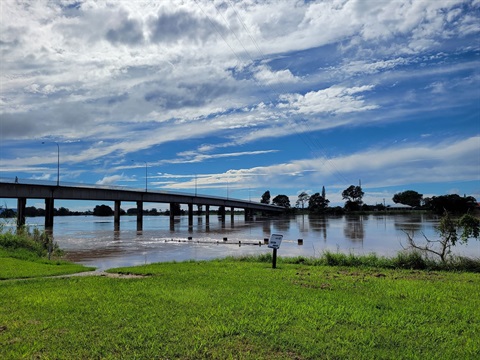Disaster Risk Reduction

Building Disaster Resilience
The Mid North Coast Joint Organisation (MNCJO) has successfully finialised the Disaster Risk Reduction (DRR) Program to proactively address and reduce the impact of natural hazards within the region. Funded by a $770,690 grant from the NSW Disaster Risk Reduction Fund (DRRF) under the joint Australian Government–NSW Government National Partnership Agreement on Disaster Risk Reduction, the program ran from January 2023 to June 2024. Its primary focus was to mitigate disaster risks and build adaptive capacity among member councils by leveraging collaborative, place-based approaches tailored to the specific needs of each community.
Key Achievements and Outcomes
-
Needs and Opportunities Analysis:
- Comprehensive Review: Conducted by GHD, this analysis provided a thorough evaluation of resilience needs and gaps across the three member councils. It included detailed Local Government Area (LGA) reports and a regional summary, aligning findings with the Australian Natural Disaster Resilience Index.
- Outcomes: The analysis highlighted specific vulnerabilities and opportunities for improvement, offering actionable insights for councils. It identified areas requiring immediate attention, enabling councils to prioritise actions that directly enhance disaster resilience. The reports also served as a foundation for strategic planning and strengthened councils' positions in applying for future funding by providing evidence-based justifications for proposed initiatives.
-
Regional Climate Change Risk Assessment:
- Assessment of Climate Impacts: This assessment explored how projected climate changes could impact assets and services across the region. It identified potential adaptation strategies, focusing on practical measures that councils could implement to reduce vulnerability to climate-related risks.
- Outcomes: By integrating the findings into their Integrated Planning and Reporting (IP&R) documents, councils now have a robust framework for embedding climate resilience into their long-term planning. This approach ensures that adaptation measures are not only considered but systematically applied across all council operations and infrastructure planning, thereby enhancing the overall resilience of the region.
-
IP&R Action Plan – Regional Framework:
- Development of a Tailored Framework: A bespoke Regional Disaster Risk Reduction Framework was developed to guide the integration of DRR actions within councils' IP&R processes. This framework included practical tools, templates, and guidelines, specifically designed to meet the needs of each council.
- Outcomes: The framework facilitated the systematic incorporation of disaster risk reduction into everyday council operations and strategic plans. Workshops and ongoing support provided by MNCJO helped ensure that councils are not only compliant with best practices but also proactive in their approach to managing disaster risks. This has led to more consistent and coordinated disaster preparedness across the region.
- Regional Disaster Risk Reduction Framework Integrated Planning and Reporting(PDF, 2MB)
-
Transport Connectivity Initiatives:
- Enhancing Resilience Through Collaboration: In partnership with Transport for NSW (TfNSW), MNCJO focused on strengthening the resilience of the transport network against severe weather events. This initiative involved improving access to critical spatial data and enabling data sharing through the Planwisely platform, which supports strategic planning and disaster response.
- Outcomes: Councils now have access to comprehensive, up-to-date data that enhances their ability to plan and manage transport infrastructure effectively. This has improved the region's connectivity and safety, ensuring that transport networks remain operational during and after natural disasters, thereby minimising disruptions and supporting swift recovery efforts.
-
Disaster Risk Reduction Network & Alumni Model:
- Building a Collaborative Network: The DRR Network created a platform for member councils, state agencies, and other stakeholders to share knowledge, best practices, and resources. Regular meetings and targeted training sessions were conducted, fostering a community of practice dedicated to improving disaster preparedness and response.
- Outcomes: The network has significantly enhanced collective resilience by promoting regional collaboration and coordination. It has allowed councils to learn from each other, adopt proven strategies, and work together on joint initiatives, thus building a stronger, more unified approach to disaster risk reduction across the Mid North Coast.
-
Community Engagement via Simtables:
- Interactive Disaster Simulations: The use of Simtables in community workshops provided a powerful tool for engaging the public in disaster preparedness. By simulating scenarios such as floods and bushfires, the workshops helped communities visualise the impacts of natural disasters and understand the importance of preparedness measures.
- Outcomes: This initiative has been highly effective in raising public awareness and promoting a culture of readiness. It empowered residents to take proactive steps in preparing for disasters, which not only enhances individual and community resilience but also supports broader regional preparedness efforts. The continued use of Simtables will be a key component of ongoing disaster readiness campaigns.
Value to Member Councils
The Disaster Risk Reduction Program has delivered substantial benefits to member councils by directly addressing current disaster risks and laying a strong foundation for future resilience. Through the development of comprehensive assessments, tailored frameworks, and collaborative networks, the program has equipped councils with the tools and knowledge needed to integrate disaster risk reduction into their strategic planning processes. This has resulted in improved evidence-based decision-making, enhanced regional collaboration, and greater capacity to manage and mitigate the impacts of natural hazards.
By enhancing resilience and preparedness, the DRR Program has ensured that member councils are better positioned to protect their communities and infrastructure from the adverse effects of natural disasters. The program's success not only fulfils its immediate objectives but also establishes a legacy of sustainable, long-term benefits for the Mid North Coast region, supporting a safer and more resilient future for all its residents.
For further information on the MNCJO Disaster Risk Reduction project contact Skye Frost, Project Coordinator on 0429985509
This project was funded under the joint Australian Government – NSW Government National Partnership on Disaster Risk Reduction.